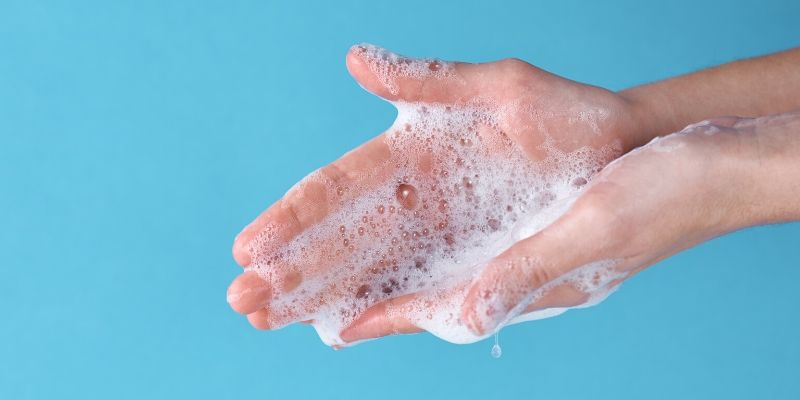The Science of Soap: How It Works to Kill Viruses

By now, you are probably familiar with the CDC’s guidelines for hand-washing to help prevent the spread of the novel coronavirus (COVID-19). But why is washing your hands so important and effective against the coronavirus, and what type of soap should you use?
Take a look at the science behind how soap works and learn the answers to popular questions about soap and viruses.
How Does Soap Work?
All viruses, including the coronavirus, are made up of genetic material that is encased in a layer of lipids, or a fatty membrane. Soap contains ingredients called surfactants, or detergents, which work by surrounding and removing those lipids. This is the coronavirus’s Achilles heel. By taking away this membrane, surfactants essentially “spill” the genetic contents of the virus, and it becomes inactive, or “dies.”
Any product that foams contains surfactants, including regular hand soap. A few examples of surfactant ingredients are:
- Sodium lauryl sulfate (SLS)
- Sodium laureth sulfate (SLES)
- Ammonium lauryl sulfate (ALS)
- Ammonium laureth sulfate (ALES)
- Sodium stearate
- Stearic acid
- Ceteareth-25
Do I Need Antimicrobial Soap?
No, you do not need antimicrobial or antibacterial soap to get rid of the coronavirus. As long as the soap contains surfactant ingredients, it will be effective. Unlike surfactants, antibacterial and antimicrobial agents in soaps do not have much of an effect on the structure of the virus or bacteria and therefore are not as effective as surfactants – but are usually more expensive. Make sure you wash for at least 20 seconds so the coronavirus gets exposed to the detergents for long enough to kill it.
What Type of Soap Is Best?
The type of soap you use does not matter, as long as it contains surfactants. Any product that foams or lathers contains surfactants. So whether you choose gel, foaming, moisturizing, unscented, scented, or another type of soap, it will all work the same against viruses. It does not have to be fancy or expensive.
Why Does Soap Work Better than Sanitizer?
Alcohol is the main active ingredient in hand sanitizer. While alcohol can help to neutralize viruses, it is not as effective as regular soap and water. There are a few reasons for this:
- Sanitizers must contain at least 60% alcohol to be effective against viruses.
- The formulation of the sanitizer matters. Water content is needed to help keep the alcohol from evaporating away too quickly.
- Most people do not use enough hand sanitizer to maximize its effectiveness.
- The friction of rubbing your hands together when washing with soap helps to remove the virus from your hands. This is not the case with hand sanitizers, as the product stays on your hands.
Another common concern with using alcohol-based hand sanitizers frequently is that the high alcohol content in these products can cause dry, irritated skin. Hand dermatitis cases are up since the coronavirus outbreak. Whenever possible, wash your hands using soap and water. However, alcohol-based hand sanitizers can work in a pinch.
Why Does Soap Irritate My Hands?
The surfactants in the soap that do such a good job at removing the lipid layer of the virus also strip away oils and lipids from your skin. This is what causes your hands to feel dry and itchy after washing your hands frequently.
To treat and prevent this, use a barrier repair moisturizer such as Zerafite Barrier Repair or Zerafite Ultra Rich Body Cream after washing your hands. These moisturizers use MLE technology to strengthen your skin’s barrier and prevent the dryness and irritation caused by soap.
Follow these other important hand-washing tips to reduce dryness:
- Take rings off before washing your hands. Soap that gets trapped under your rings will irritate your skin.
- Be sure to rinse off all the soap from your hands after washing.
- Pat dry with a soft towel, rather than rubbing vigorously.
Bottom Line
Hand-washing is one of the most effective ways to prevent the spread of viruses like the coronavirus. Follow the CDC’s guidelines to wash your hands for at least 20 seconds using soap and water – and don’t worry if you’re using a generic brand of soap. You do not need anything fancy, as long as it has surfactant ingredients.
Follow with a barrier repair moisturizer to soothe and prevent dryness and irritation caused by frequent hand-washing.
©2020 Metabeauty, Inc.


